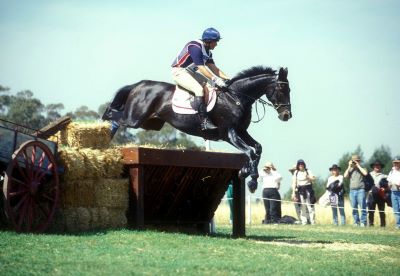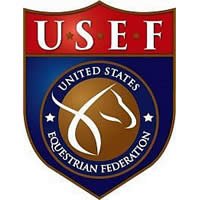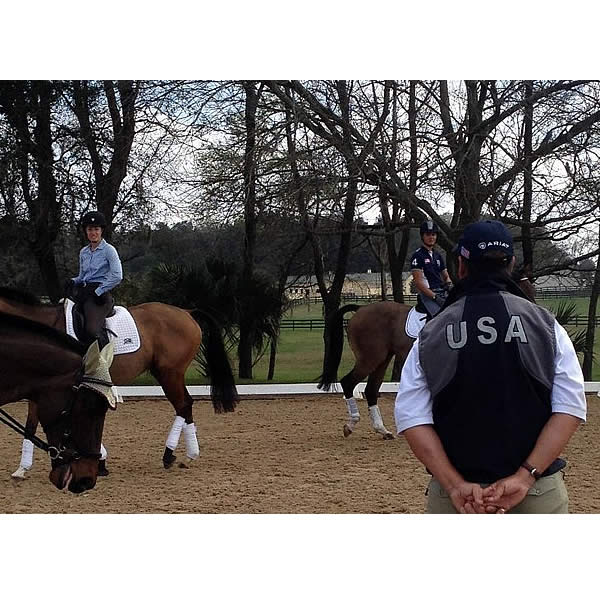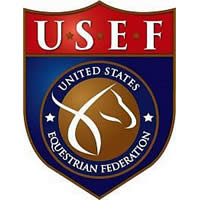David O’Connor (USA) with the brilliant Custom Made who claimed individual gold at the Sydney 2000 Olympic Games. (Photo credit: FEI)
It’s probably not that surprising that David O’Connor’s career thrived throughout the era of long-format Eventing, because if you’ve crossed the vast expanse of North America on horseback when you’re just 11 years old then going the distance is unlikely to be daunting at any stage of your life.
The 2000 Olympic Eventing champion retired from international competition in 2004, served as President of the United Stated Equestrian Federation (USEF) for the next eight years, and was inducted into the United States Eventing Association’s Hall of Fame in 2009. He now trains young horses, coaches riders, and designs courses, and he sees it all as a natural progression. “I’m in this game 45 years, and as time goes on you move on to the next level. For me that’s the training side of the sport, and I really enjoy it a lot,” says the man who became Chair of the FEI Eventing Committee three years ago.
He’s travelling to a show the day I call him up to ask him about his life and times. So how did he get started with horses? Did his family have a generational connection with them?
“No, my mum was brought up in suburban London (GBR) and she rode a bit, but it was only when she came to the US that she really got into it. My father wasn’t horsey at all; he worked in the Navy, but my brother Brian and I went to the local Pony Club when we were kids and that’s how it all began,” he explains. Mum, Sally O’Connor, would go on to become a Dressage rider, judge, and author while Brian’s voice is one of the most recognisable on the US equestrian commentary circuit. David, meanwhile, became a superstar Eventing athlete, greatly admired for the long and successful partnerships he established with a superb string of horses.
Ambitions
He says he didn’t have big ambitions as a child. “We weren’t wealthy so I never thought horses would be my life,” he explains. But when he was 17 years old, fate intervened. Spotted by legendary coach Jack Le Goff, he joined training sessions for development riders staged at the USEF Training Centre in Massachusetts (USA) and was invited to stay on.
“It was an amazing opportunity, a door that opened for me and I kinda ran through it as fast as I could! I was there for four-and-a-half years, and without that opportunity I’m really not sure where my life would have gone.”
His teenage heroes included Jimmy Wofford, Mike Plumb, “and Bruce (Davidson), who was dominating the sport across the world at the time.” David has maintained a lifetime connection with Jimmy, who he describes as a mentor and great friend. Like Jimmy, David’s career almost completely embraced the long-format era of Eventing which was very different to the scaled-back test horses and riders face today.
The old three-day formula consisted of Dressage on day 1 followed by Roads and Tracks, Steeplechase, more Roads and Tracks, and then Cross-Country on day 2, with showjumping on the third and final day.
“I was the last long-format winner at the Olympic Games (Sydney 2000) and World Championships (Jerez 2002), and I experienced the change to the modern-day sport,” he points out. “It’s certainly different doing a 13-minute course back then and an 11-minute course now. Today the intensity is higher, so horses can get out of breath quite quickly if you don’t manage your speed. Back then we managed galloping all the time, the horses were very fit, more thoroughbred types. There are horses that are not as thoroughbred that can do quite well in a 4-Star today, but they can’t manage a 5-Star. Now it’s all about turning and accuracy and having horses jump narrow fences… the rideability is more important than the athletic ability, whereas the athletic ability was more important back then. And there’s a huge difference between showjumping after cross-country and showjumping before,” he adds.
Brilliant horses
David had many brilliant horses, the best-remembered possibly his Olympic rides Giltedge and Custom Made. At the 1996 Games in Atlanta, he rode Giltedge to team silver and Custom Made to individual fifth place, and four years later Custom Made claimed individual gold in Sydney (AUS) while Giltedge was on the bronze-medal-winning US side.
So how would these two special Irish-bred horses cope with the challenges of the modern sport?
“Giltedge would be just as successful now as he was back then because he was extremely rideable and a very good showjumper, in fact he would have an even better career now because he would have been totally in the game! Custom Made would still be a big 5-Star horse; he would revel in it just like he did because his big wins were all over galloping courses like Badminton, Kentucky, the Sydney Olympics, but probably not so much at Olympic Games and World Championships because the courses are getting shorter and more twisting and turning and that wouldn’t play to his strengths.
“One of the great things about these two, and many of our other horses like Biko and Prince Panache, was that they stayed sound and played the game for so long. They were Irish-bred and we can’t afford to lose the genetic advantages that the Irish bloodlines bring, like longevity and athleticism, which maybe some of the other countries don’t have,” he says.
When it comes to longevity, Custom Made was a perfect example, only passing away last year at the ripe old age of 34.
Prepare
So how did he prepare horses like these two all-time greats? “With a lot of long, slow work three or four months away from the event to put a base on them, and faster work closer to the competition,” he explains. The long, slow work was exactly that. “Sometimes you’d spend two hours on them riding up and down hills, trotting, slow cantering, and walking. Some of the kids coming up now don’t want to put that work in,” he points out.
And did the horses have similar personalities? “No, Custom Made (a.k.a. Tailor) had tremendous strength and scope and the most unbelievable gallop. He never got tired in his life and was an incredible athlete, but he was quite sensitive about a lot of things and when he got nervous he got very strong.
“But I never had a horse try as hard as Giltedge; he always rose to the occasion. There was this super-power thing that happened at a competition; he would turn into a horse that fought for you more than any other horse I’ve had in my life. That’s why he became such a great team horse for the US. I only ever had one rail down in showjumping with him and he was always going to be in the top 10 – he was one of those troopers you could always rely on,” David says proudly.
He relishes the relationships he had with both horses. “At the beginning of their careers I felt they were part of my career but towards the end of their competitive cycle it was me who was part of theirs! I just had to do my job and let them get on with theirs. When they retired, we gave demonstrations and they became even more famous. They had a huge fan-club; people just loved them, and not many horses get that because there are not a lot of really famous horses around anymore – I think their longevity had a lot to do with that,” he comments.
Family ride
When I ask him about the family ride across the United States of America, I can tell that there’s a determined streak in the O’Connor gene pool. He recalls a family dinner during which his mother announced her plan. “She had this romantic image of the US as the Wild West… John Wayne and all that. We lived in Maryland on the East Coast and she came up with the idea that we should ride to California on the West Coast, and the more people said it couldn’t happen the more she was determined it would. It was an amazing decision for her to make!” David says with a laugh.
So on 13th May 1973 they set off on the 3,000 mile trip that took 14 weeks to complete. “I was 11, Brian was 13 and it was just the three of us. We ended up going to Oregon instead of California because otherwise we would have had to cross the desert, and we didn’t quite make it to the west coast because Brian and I had to go back to school at the end of August,” David says. Brian’s horse did the full distance while David and Sally both needed remounts en route, turning the original two out to rest until they were collected on the way home.
“My mother knew people across the first-half of the country, and we stayed with them about every 10 days and gave the horses a couple of days off each time. But we didn’t know anybody beyond the Mississippi River, so we just knocked on people’s doors when we got to the end of the day, explained what we were doing and everyone East of the river said, ‘You’re going WHERE?!’ and everybody West said, ‘You’re from WHERE?!’ We were doing 30-35 miles a day and local newspapers started following us.
“It was an amazing trip for an 11-year-old kid and taught me a lot about spending time with horses and appreciation of the land and how people make a living. And it gave me a sense of time, not control over time but how to enjoy being in the moment, and that has always stayed with me. It was 47 years ago, and I still think about it often,” David says, clearly enjoying the memories.
Bitless
I ask David about riding without a bit in the horse’s mouth. He’s quite an advocate for bitless riding, but he points out that it has its limitations when it comes to competition.
“We start all of our young horses in rope halters without a bit, and when we are going on a quiet hack most are in just a halter, and we practice this a lot. They learn to go, stop, turn, rein-back, and all that, so when we put a bit in their mouth there is no anxiety about it.
“But there’s a huge difference when you are out on a course for 8 to 10 minutes galloping at a speed of 570 metres a minute. You can’t compare riding in a ring or quietly hacking with the need for the horse to be able to answer cross-country questions – they are two totally different things. From a risk-management point of view there is no way I would ever go cross-country for miles without having a bit.”
Admired
I ask him about the people he most admired during his time at the top of the sport and the first person he mentions is, unsurprisingly, New Zealand’s Mark Todd – “a great horseman and a good friend.”
He describes the period when he and his wife and fellow-Olympian, Karen O’Connor, lived in England as “magical. In the 90s, we were part of a group of riders including Mary King (GBR) and Blythe Tait (NZL) who were all there at the same time competing against each other and who became the best of friends. It drove us all to be better, there were 15 players at the top of the world sport all living near each other and it was a very special time,” he recalls.
So why didn’t he and Karen stay in Great Britain? “We had the opportunity to ride for Mrs Mars who became a big supporter of ours. She bought a place in Virginia and asked us to come back and run a High Performance Programme out of there. But if that opportunity hadn’t come our way, we might have stayed – who knows?” he says.
Wisdom
Finally, I ask David to share some wisdom with the next generation of young Event athletes. “The main thing is to have a goal that’s way out in front of you and to work hard to get there. Surround yourself with the best people you can find and learn your craft to the nth degree.
“As Mark Twain wrote. ‘It’s very easy to learn the tricks of the trade and never learn the trade.’ You need to learn every aspect of the trade and that includes the people part, the horse part, the riding part, the competitive part, and the management part. You don’t become a winner because you’re talented and you deserve it; you have to be driven and you need to be hungry if you want to succeed.
“And one of the things I tell all my students is that when you get an opportunity [like David did when spotted by Jack Le Goff], then grab it with both hands!”
By Louise Parkes
Media contact:
Shannon Gibbons
Media Relations and Communications Manager
shannon.gibbons@fei.org
+41 78 750 61 46




 Lexington, KY – David O’Connor will not be representing the U.S Eventing Team at the Boekelo CCIO3* as reported in the
Lexington, KY – David O’Connor will not be representing the U.S Eventing Team at the Boekelo CCIO3* as reported in the